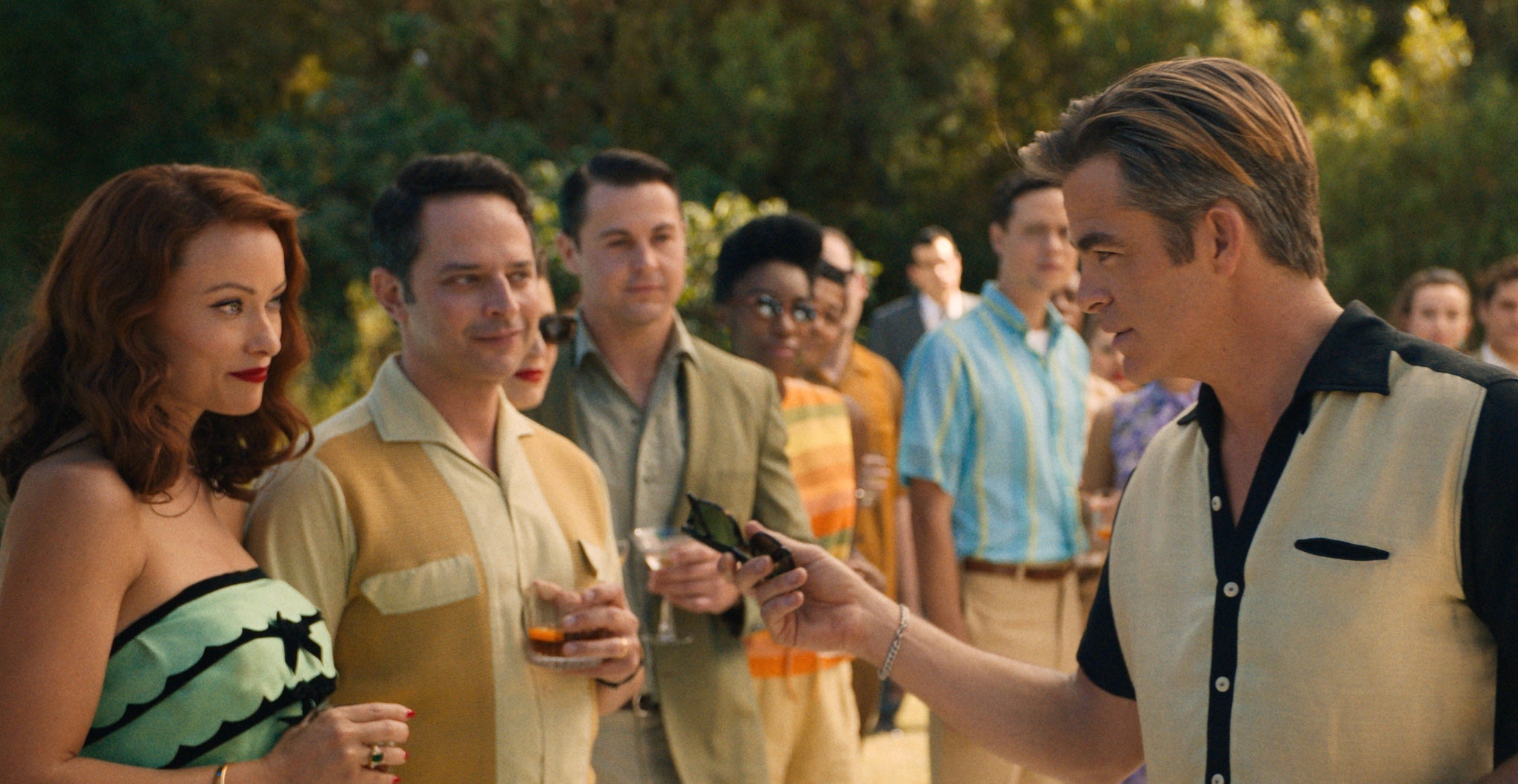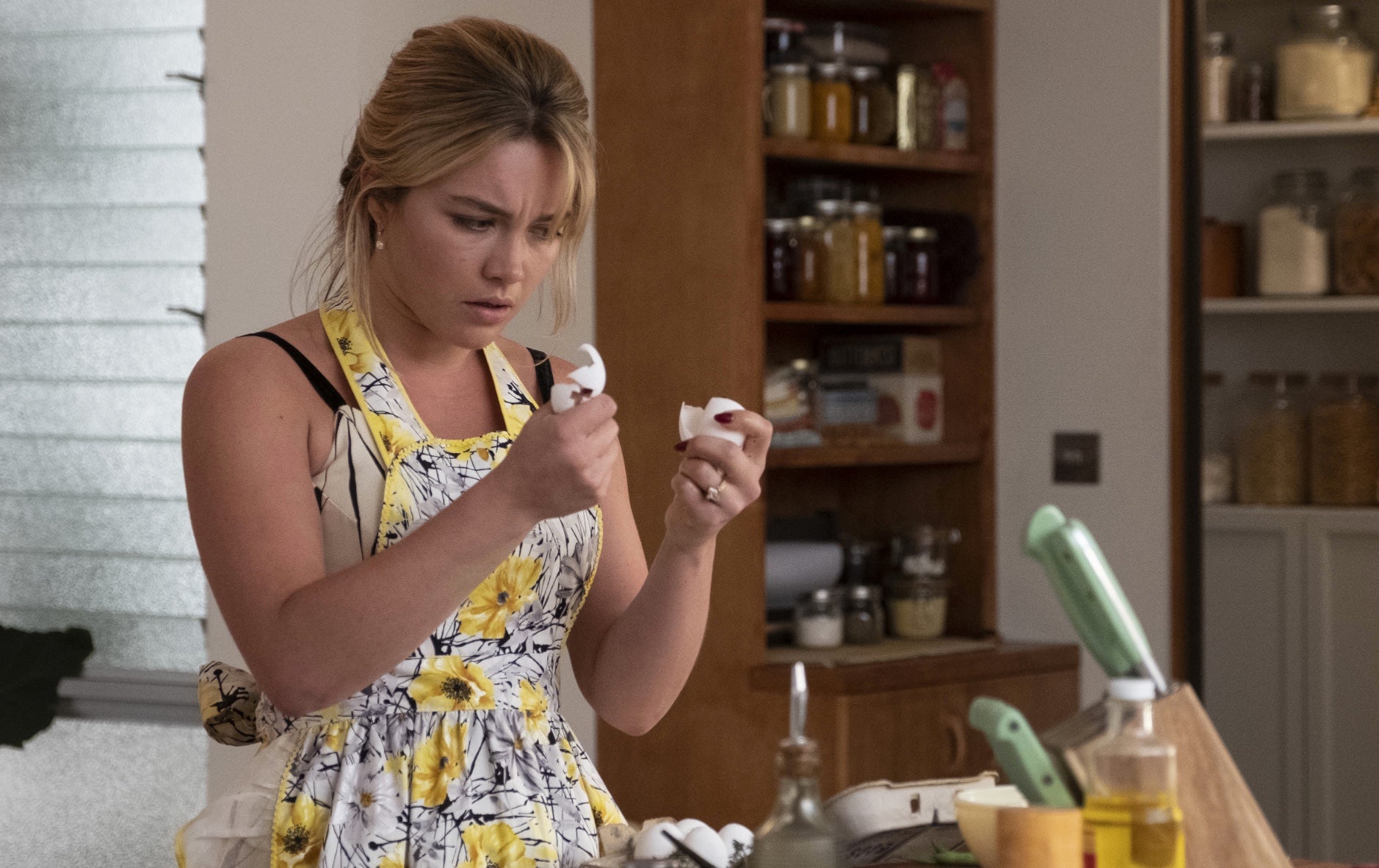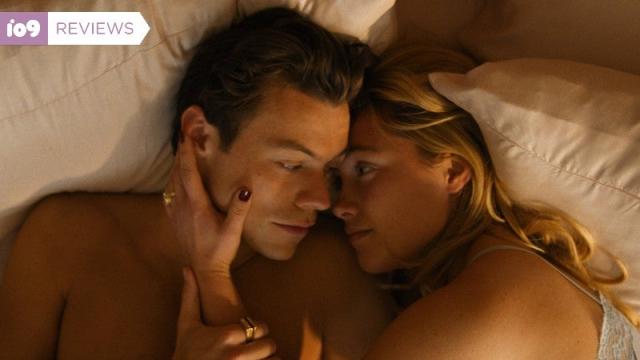Don’t Worry Darling has style. And we don’t just mean Harry Styles. It’s got an incredible look and feel about it. Impeccable production and costume design. Bright, beautiful cinematography. Memorable, impactful musical choices and a hypnotic, distinctive score. There’s no doubt that director Olivia Wilde has crafted a world and film that oozes panache and wonder. It’s just a shame that the story it’s in service of never quite lives up to it.
In Don’t Worry Darling, Alice (Florence Pugh) and Jack (Harry Styles) seem to have a perfect life. He’s got a great job, she’s got a ton of friends, they’re constantly intimate, and they live in the beautiful town of Victory. Victory is an isolated desert community in which all the husbands in the town work for a singular company called the Victory Project. Meanwhile, all the wives stay home, gossip, drink, and make sure there’s a home-cooked meal on the table when the men get home. If that sounds like a very dated, borderline offensive portrayal of life and gender, you’re on the right track. Though it’s never explicitly stated, everything about life in Victory screams outdated 1950s movie. Almost if that’s by design.

The design comes from Frank (Chris Pine), the leader of Victory Project, who is an almost religious deity to his neighbours and employees. Frank is selling heaven on Earth, but that all changes when one of the women in town, Margaret (KiKi Layne), starts to complain about things being wrong. Soon, Alice starts to agree with her. Thus begins an elaborate mystery where Alice challenges the very notion of Victory, much to the chagrin of pretty much everyone around her. It’s her versus the world.
Obviously, everything is not what it seems in Victory and, as you’d expect, Alice does begin to unravel things. However, once the actual truth of the situation is revealed, it all comes apart. The audience is bombarded with information and action for the film’s final 20 minutes or so until the movie ends rather abruptly. For a film that has been so meticulous about every little detail, the shift in tone and story is unexpected and damaging.
All of those reveals and information are crucial to the overall story, filling in plot holes, and hammering home some of Wilde’s ultimate themes, which involve gaslighting, misogyny, and privilege. But because it happens so suddenly, and the movie has previously been so cautious tiptoeing around its truths, you’re ultimately left more curious about the hows and whys of the big reveal instead of the film’s intentions. The point of the film is lost because it’s rushed and doesn’t make a lot of sense.

This is a shame because, as we said, Don’t Worry Darling is an otherwise impeccably made movie with some top-notch performances. Pugh is beyond captivating, giving a multilayered portrayal that’s confident and content on the surface, with a layer below that’s slowly unravelling. Each scene in the film sees that interior slowly overtaking the exterior until her scared confusion finally merges with the assertiveness. As her husband, Styles is purposefully charming to an extent that makes you kind of fear him, which adds a nice touch to the story. Supporting roles from the likes of Nick Kroll, Gemma Chan, Timothy Simons, and Wilde herself are all up to the task. Then the other standout is Pine, who makes his cult leader so damn watchable you’re ready to follow him yourself. He also has a few dynamite tete-a-tetes with Pugh that are among the movie’s best scenes. Those performances, coupled with the film’s tantalising worldbuilding, set the table nicely — but, again, are ultimately let down by the structure and pacing of the story, which is backloaded and murky.
There’s plenty to like in Don’t Worry Darling, and you’d imagine multiple viewings knowing the truth of the narrative might make for a more even experience. But on first viewing, it all comes crashing down, like if the table broke under a jigsaw puzzle when you went to add the final piece.
Don’t Worry Darling is now in theatres.
Want more Gizmodo news? Check out when to expect the latest Marvel and Star Wars releases, what’s next for the DC Universe on film and TV, and everything you need to know about House of the Dragon and Lord of the Rings: The Rings of Power.
